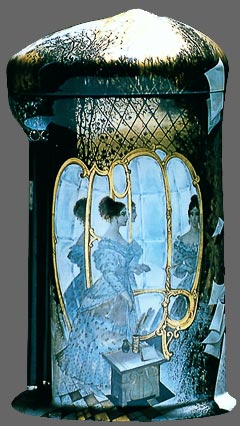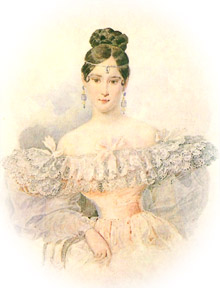|
French version
|

|
"Entry
into Moscow is forbidden, and here I am, confined in Boldino.
In the name of heaven, dear Natalia Nikolaevna, write me, even
though you may not feel like it. Tell me, where are you? Have
you left Moscow? Is there a roundabout route which might lead
me to your feet? I am completely discouraged, and I really do
not know what to do. It is clear that our marriage will not take
place this year (accursed year)...Boldino has the air of a rock-bound
island. No neighbors, no books. Frightful weather. I spend my
time scribbling and fuming... Write me some news of him, because
I am not reading any periodicals at all here. I am becoming imbecilic
with a vengeance... But enough of bad jokes. I'm smiling yellow,
as the fishwives say... Farewell, my beautiful angel. I kiss the
tips of your wings, as Voltaire used to say to people who were
no peers of yours."
|
| |
The letter
of A. Pouchkine to N.Goncharova 11 octobre 1830
|
|
|

S.Kozlov."Natalya Goncharova"
Box. 1981 Fedoskino
|
|
|
At moments when your graceful form
In my embrace I long to capture,
And from my lips a tender swarm
Of love's endearments pour in rapture –
Without a word your supple shape
From my encircling arms unfolding,
You make your answer by escape
And smile at me, all trust withholding;
Too keenly mindful in your heart
Of past betrayal's doleful mention,
You bide in listless inattention
And hear me not and take no part...
I curse the cunning machinations,
That were my sinful youth's delight,
Those hours awaiting assignations
In gardens, in the dead of night.
I curse the lover's whispered suing,
And tuneful verse's magic aids,
Caress of rashly trusting maids,
Their tears, and their belated ruing.
A.Pushkin. 1831
|
|
.. Forty-eight
hours before the wedding Pushkine went to the gypsies.
"Sing me something to bring me
luck," he said to Tanya; "I'm getting married, you
know."
Tanya took her guitar and intoned a
song so mournful that Pushkin suddenly burst into sobs and buried
his head in his hands. His friends rushed over.
"What's wrong, Pushkin?"
"Ah!" he said, "that
song has finished me. It foretells some great sorrow, not joy."
On the eve of the wedding, Pushkin invited
his friends to bury his bachelorhood with him. A dozen guests
gathered around the table, all prepared to joke, laugh and drink,
as is the custom on such occasions. But their host was so lugubrious
that they hardly dared open their mouths. He recited some lines
of farewell to his youth - as though he were taking leave of
life itself, not just unmarried life; as though he were about
to die, not acquire a wife. He was reading his last will and
testament, uttering his final word: Tomorrow he would cease
to exist. His listeners stared at one another in dismay and
shook their heads. Then, with foggy brain and contracted throat,
Pushkin left them to make his final visit to his fiancee.
The next day, February 18, 1831, the
marriage of Alexander Sergeyevich Pushkin and Natalya Nikalayevna
Goncharova was solemnized in the big Church of the Ascension
at Nikitskaya Gate in Moscow. Police directed the arrival and
departure of the coaches. Inside the church, a large, elegant,
malicious, whispering throng crowded into the nave. Natalya's
entrance into the gilded cavern filled with wavering lights
and incense was greeted by a rustle of admiration. The choir
sang lustily. The bride came forward gliding over the carpet,
so light, so white, so beautiful that Pushkin was genuinely
moved. He smiled broadly and drew himself up to his full height,
for Natalya was taller than he. The ushers held the ceremonial
crowns over their heads. The bearded, solemn priest intoned
the words uniting them for life. The guests chattered in undertones,
estimating the cost of the gowns and the probable consequences
of this extravagant display.
Suddenly, during the exchange of rings,
one of the circlets fell to the floor. Bending over to retrieve
it, Pushkin knocked against the lectern and, according to one
witness, the crucifix and Gospels dropped with a thud. Pushkin's
candle went out. The poet stood up again, extremely pale, and
simply murmured, "All the bad omens..."
|
| |
Henry Troyat. "Alexander Pushkin" |
© 2004 Artrusse
Email
|
|

A.Briullove "N.Goncharova"
Aquarelle. 1831
|
|
On February 8, 1837 Alexander Pushkin was
mortally wounded in a duel with Baron George Heckeren d'Anthes,
adopted son of the Dutch minister then resident in St. Petersburg,
and died two days later. D'Anthes had been the centre of scandalous
gossip regarding Pushkin's wife. Perhaps partly to quell this
talk, he had married Natalia's sister, Catherina Goncharova.
But the talk did not die, nor, according to some biographers,
did d'Anthes' attention to Natalia, even after his marriage.
After Pushkin death and a year of the grief
in the country Natalya Goncharova returned to St. Petersburg,
and the Tsar, meeting her in the English Store, declared that
he would like to see her back at the Court balls. She had
two sons and two daughters by Pushkin, for whom the Tsar provided
generously. In 1844, she was re-married to an old admirer,
Major-General Peter Petrovich Lanskoy. On his marriage he
was quite suddenly promoted by the Tsar to Commandant of the
House Guards. The Tsar insisted too on having a portrait of
Natalie placed in a photo album of all the officers, and on
becoming godfather to her first child. She appears to have
been more happily married this time, had two children and
died on November 26th 1863 aged fifty-one.
|
|